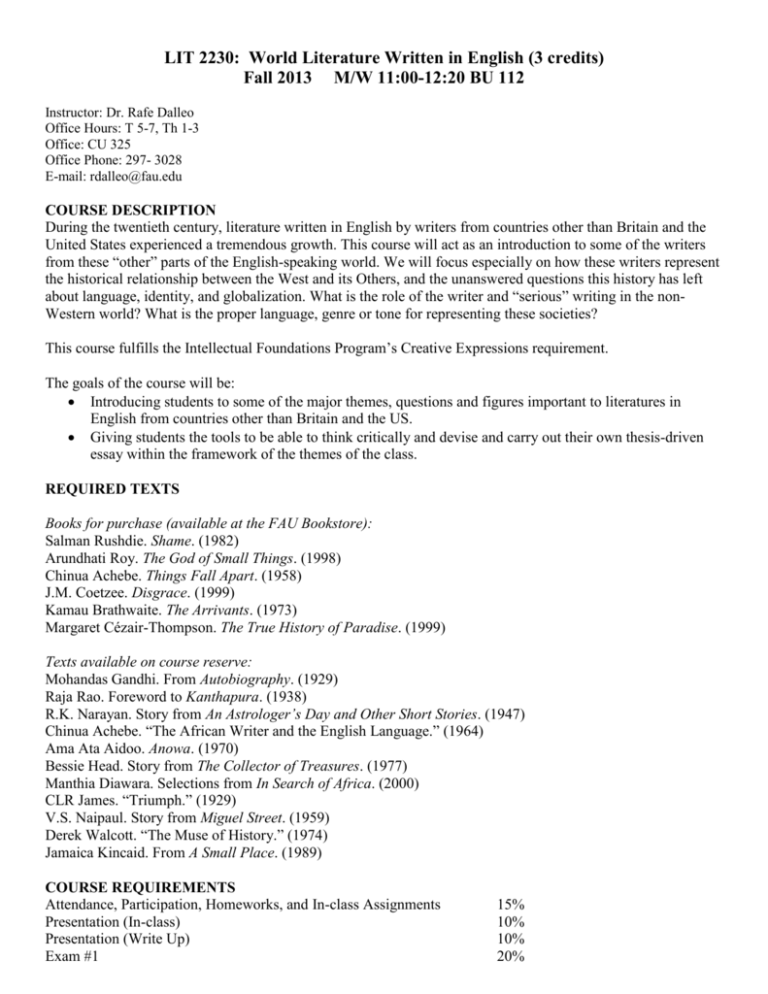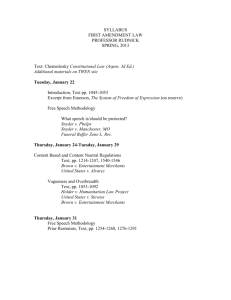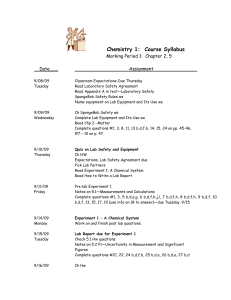syllabus - Florida Atlantic University
advertisement

LIT 2230: World Literature Written in English (3 credits) Fall 2013 M/W 11:00-12:20 BU 112 Instructor: Dr. Rafe Dalleo Office Hours: T 5-7, Th 1-3 Office: CU 325 Office Phone: 297- 3028 E-mail: rdalleo@fau.edu COURSE DESCRIPTION During the twentieth century, literature written in English by writers from countries other than Britain and the United States experienced a tremendous growth. This course will act as an introduction to some of the writers from these “other” parts of the English-speaking world. We will focus especially on how these writers represent the historical relationship between the West and its Others, and the unanswered questions this history has left about language, identity, and globalization. What is the role of the writer and “serious” writing in the nonWestern world? What is the proper language, genre or tone for representing these societies? This course fulfills the Intellectual Foundations Program’s Creative Expressions requirement. The goals of the course will be: Introducing students to some of the major themes, questions and figures important to literatures in English from countries other than Britain and the US. Giving students the tools to be able to think critically and devise and carry out their own thesis-driven essay within the framework of the themes of the class. REQUIRED TEXTS Books for purchase (available at the FAU Bookstore): Salman Rushdie. Shame. (1982) Arundhati Roy. The God of Small Things. (1998) Chinua Achebe. Things Fall Apart. (1958) J.M. Coetzee. Disgrace. (1999) Kamau Brathwaite. The Arrivants. (1973) Margaret Cézair-Thompson. The True History of Paradise. (1999) Texts available on course reserve: Mohandas Gandhi. From Autobiography. (1929) Raja Rao. Foreword to Kanthapura. (1938) R.K. Narayan. Story from An Astrologer’s Day and Other Short Stories. (1947) Chinua Achebe. “The African Writer and the English Language.” (1964) Ama Ata Aidoo. Anowa. (1970) Bessie Head. Story from The Collector of Treasures. (1977) Manthia Diawara. Selections from In Search of Africa. (2000) CLR James. “Triumph.” (1929) V.S. Naipaul. Story from Miguel Street. (1959) Derek Walcott. “The Muse of History.” (1974) Jamaica Kincaid. From A Small Place. (1989) COURSE REQUIREMENTS Attendance, Participation, Homeworks, and In-class Assignments Presentation (In-class) Presentation (Write Up) Exam #1 15% 10% 10% 20% Exam #2 Final Exam 20% 25% CODE OF ACADEMIC INTEGRITY: The University policy regarding academic integrity is enforced in this course. Students at Florida Atlantic University are expected to maintain the highest ethical standards. Dishonesty is considered a serious breach of these ethical standards, because it interferes with the University mission to provide a high quality education in which no student enjoys an unfair advantage over any other. Dishonesty is also destructive of the University community, which is grounded in a system of mutual trust and places high value on personal integrity and individual responsibility. Harsh penalties are associated with academic dishonesty. For more information, see: http://www.fau.edu/regulations/chapter4/4.001_Code_of_Academic_Integrity.pdf DISABILITY STATEMENT: In compliance with the Americans with Disabilities Act (ADA),students who require special accommodations due to a disability to properly execute coursework must register with the Office for Students with Disabilities (OSD) located in Boca Raton SU 133 (561-297-3880), in Davie - LA 240 (954-236-1657), in Jupiter - SR 110 (561-799-8585) and follow all OSD procedures SCHEDULE Week 1 Tuesday Thursday India Introduction to the class. (Handout excerpt from Edward Said’s Orientalism) Mohandas Gandhi. Excerpt from Autobiography. (1929) Week 2 Tuesday Tuesday Raja Rao. Foreword to Kanthapura. (1938) R.K. Narayan. Story from An Astrologer’s Day. (1947) Week 3 Tuesday Thursday Salman Rushdie. Shame. (1982) Salman Rushdie. Shame. (1982) Week 4 Tuesday Thursday Salman Rushdie. Shame. (1982) Arundhati Roy. The God of Small Things. (1998) Week 5 Tuesday Thursday Week 6 Tuesday Arundhati Roy. The God of Small Things. (1998) Arundhati Roy. The God of Small Things. (1998) Distribution of topics for Exam #1 Thursday Africa Chinua Achebe. “The African Writer and the English Language.” (1964) Exam #1 due Chinua Achebe. Things Fall Apart. (1958) Week 7 Tuesday Thursday Chinua Achebe. Things Fall Apart. (1958) Ama Ata Aidoo. Anowa. (1970) Week 8 Tuesday Ama Ata Aidoo. Anowa. (1970) Thursday Bessie Head. Story from The Collector of Treasures. (1977) Week 9 Tuesday Thursday Manthia Diawara. Excerpt from In Search of Africa. (2000) J.M. Coetzee. Disgrace. (1999) Week 10 Tuesday Thursday Week 11 Tuesday J.M. Coetzee. Disgrace. (1999) J.M. Coetzee. Disgrace. (1999) Distribution of topics for Exam #2 Thursday The Caribbean CLR James. “Triumph.” (1929) Exam #2 due V.S. Naipaul. Story from Miguel Street. (1959) Week 12 Tuesday Thursday Kamau Brathwaite. The Arrivants. (1973) Kamau Brathwaite. The Arrivants. (1973) Week 13 Tuesday Thursday Derek Walcott. “The Muse of History.” (1974) Jamaica Kincaid. From A Small Place. (1989) Proposals for final essay due Week 14 Tuesday Thursday Margaret Cézair-Thompson, The True History of Paradise. (1999) Margaret Cézair-Thompson, The True History of Paradise. (1999) Week 15 Tuesday Thursday Margaret Cézair-Thompson, The True History of Paradise. (1999) Final Exam Review Week 16 FINAL EXAM EXPLANATION FOR COURSE REQUIREMENTS Students will each give one in-class group presentation of approximately 15 minutes. In addition to the inclass portion of the presentation, the group will also submit a 2-3 page write-up of the presentation. Guidelines for this assignment will be distributed. One grade will be given to the entire group, so it is up to you to make sure that everyone does a fair amount of work. The first two major assignments will be take-home exams in which students will write a brief essay (3-4 pages) in response to a specific question. The goal of these assignments will be to encourage students to recognize and engage in some of the critical conversations in this field. The final exam will be longer (5-6 pages) and will be a thesis-driven argument in which the student decides on his or her own topic, in keeping with the overall concerns of the course. The final exam will include an essay; your response will incorporate at least one text from the final unit of the course, and at least one text from one of the other units. Informal Writing Assignments The informal writing assignments fall into two categories: pre-reading homework assignments which the students will prepare at home and hand in to me, and journal writing and freewriting which will be done in class as a private activity to help students collect and focus their ideas. The homeworks will give students a chance to get feedback from the professor on their responses to the readings; the journal writing allows them a more private and unstructured space to relate to the readings on a personal level. Both types of assignments will prepare students for the final essay by showing them what kinds of questions might be asked in a research project, but also by allowing them to explore what aspects of the texts interest them most. Pre-reading homework assignments: Week 2: In your own words, explain Orientalism. Week 3: Who is the narrator of Shame? What do we know about him/her? Week 7: Could the district commissioner be the person telling this story? Why or why not? Week 8: Which character from When Rain Clouds Gather do you relate to or identify with most easily? Why? Week 9: Why the title In Search of Africa? What is Diawara searching for? What does he find? Week 13: Why does the novel suggest that Sylvia makes the choice that she does? What are the implications of her choice? Week 14: What does the novel seem to be saying about the mixing of different cultures? Journal writing prompts: Week 1: What does “literature” mean to you? Week 4: What are your earliest childhood memories of an historical event? Is there any particular event in your life that you associate with it? Week 5: Did the novels from this unit confirm or challenge what you thought about India and Pakistan before you read them? Week 6: Achebe writes about the politics of writing in a certain language. Do you write in different ways for different audiences? What are some of the power dynamics that affect the way that you write? Week 10: What did you think of the protagonist of Disgrace? Did you like him or dislike him? Did you identify with him? Why or why not? Week 11: What emotions do reading Walcott and Kincaid make you feel? Do the different essays affect you differently? How does each author achieve those effects? Week 12: Have you gone through any of the things that Ralph describes? Could you relate to his story?






